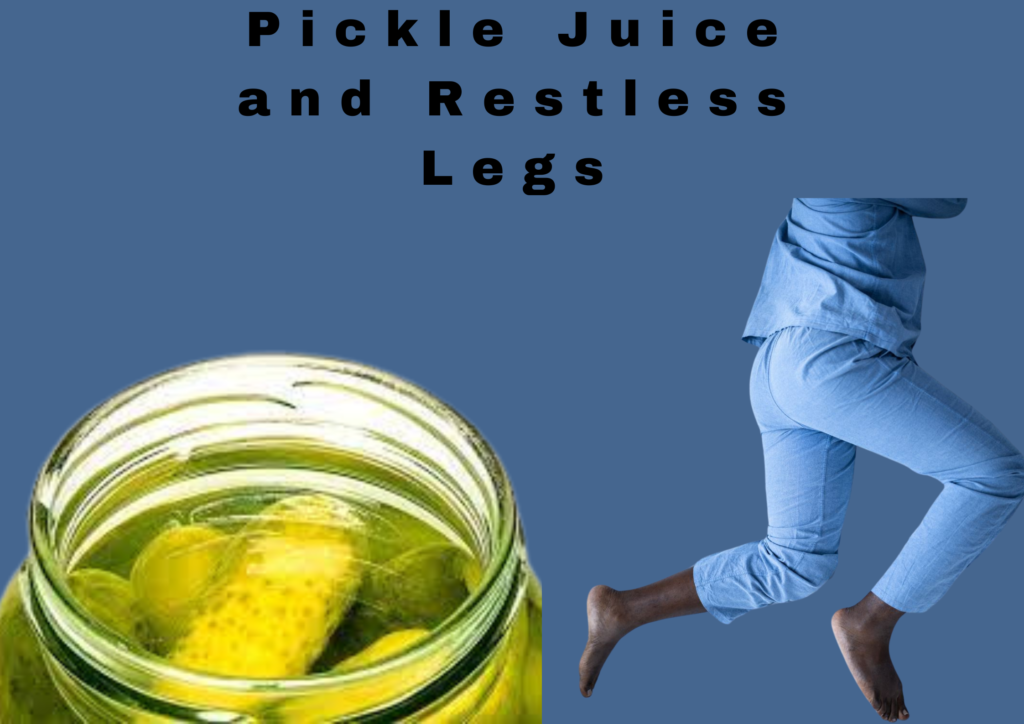The Truth About Pickle Juice and Restless Legs: Should You Try It?

Have you ever woken up in the middle of the night
with an uncontrollable urge to move your legs? If so, you’re likely familiar
with the frustrating sensation of restless legs syndrome (RLS). This
neurological disorder can disrupt sleep, leaving you feeling exhausted and
irritable. While conventional treatments exist, some natural remedies have
gained popularity, with pickle juice being a surprising contender.
But can this tangy beverage truly soothe restless
legs? Let’s delve into the science behind this unusual home remedy, explore its
potential benefits and drawbacks, and ultimately answer the question: should
you give pickle juice a try for your RLS?
The Restless Legs Conundrum: Understanding RLS
Restless legs syndrome is characterized by an
irresistible urge to move your legs, usually accompanied by an unpleasant
crawling, tingling, or aching sensation. These symptoms typically worsen at
night, making it difficult to fall asleep or stay asleep.
RLS can significantly impact your quality of life,
leading to daytime fatigue, anxiety, and depression. While the exact cause
remains unknown, several factors are thought to contribute to RLS, including:
- Iron deficiency: Low iron stores are a major risk factor for RLS, especially in women.
- Neurological conditions: Parkinson’s disease and neuropathy can increase the risk of RLS.
- Pregnancy: Hormonal changes during pregnancy can trigger RLS in some women.
- Medications: Certain medications, particularly antihistamines and antidepressants, can worsen RLS symptoms.
The Rise of Pickle Power: Can Pickle Juice Really Help?
For decades, athletes have sworn by the power of
pickle juice to relieve muscle cramps. This anecdotal evidence has trickled
down to RLS sufferers, with some finding relief after consuming pickle juice.
However, the scientific explanation for pickle juice’s potential benefit
remains to be seen. Here are some theories:
- Electrolyte Replenishment: Pickle juice is rich in electrolytes, particularly sodium and potassium. Electrolyte imbalances have been linked to muscle cramps and possibly RLS, so replenishing electrolytes with pickle juice might provide some relief.
- Acidity Trigger: The vinegar content in pickle juice might trigger nerve reflexes that help to relax muscles and alleviate the urge to move.
- Placebo Effect: The belief in pickle juice’s effectiveness may play a role. Studies suggest that even a placebo can provide some relief for RLS symptoms.
Limited Scientific Evidence:
While anecdotal evidence and some small-scale
studies suggest a potential benefit of pickle juice for RLS, large-scale,
well-designed clinical trials still need to be improved. More research is needed to
definitively confirm its effectiveness.
Should You Take the Pickle Plunge?
If you’re curious about trying pickle juice for
RLS, here are some things to consider:
- It’s a Natural Remedy: If you prefer natural approaches, pickle juice offers a potential alternative to medication.
- Relatively Safe for Most: Pickle juice is generally safe for consumption in moderate amounts, though people with high blood pressure or following a sodium-restricted diet should consult a doctor before trying it.
- Taste Test: Be prepared for the strong flavour. Chilled pickle juice might be easier to tolerate.
- Start Small: Begin with a small amount (1-2 tablespoons) and gradually increase if needed.
- Listen to Your Body: If you experience any discomfort after consuming pickle juice, discontinue use.
Remember: Don’t abandon conventional treatment based solely on pickle juice.
Always consult your doctor about managing your RLS and discuss if this remedy
might fit your treatment plan.
Social Proof: What People Are Saying
Here’s a glimpse into what others have experienced
with pickle juice and RLS:
- “I was skeptical, but pickle juice actually works for me! The cramps stop within minutes.” – John R., Athlete
- “I can’t believe it, but pickle juice helps me fall asleep faster when the RLS acts up.” – Sarah B., RLS sufferer
- “The taste is rough, but I’d rather have that than restless legs all night.” – David M., Pickle juice advocate
It’s important to
note that these are individual experiences and may not be representative of
everyone.
Frequently Asked Questions (FAQs)
Q: How much pickle juice should I drink for RLS?
A: Start with a small amount (1-2 tablespoons) and increase gradually if
needed.
Q: What type of pickle juice is best?
A: Any type of pickle juice will likely work, but choose one with a good
amount of vinegar and electrolytes (sodium and potassium).
Q: Are there any side effects to drinking pickle juice?
A: In moderation, pickle juice is generally safe.
Table of Contents
SEARCH HERE
CATEGORIES
- FOOD
- TRAVEL
- List Item #3
- HEALTH & FITNESS
- HOME & GARDENING
- PETS